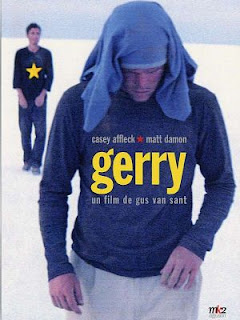 Certainly my least favorite of the Death trilogy, I think that viewing the trilogy out of order diminished the potency of Gerry for me. Had I seen Gerry when it was first released in the cinema as a follow up to Finding Forrester, I think that the sparseness and ambition of it would have been more jarring. I mean, it’s unsettling enough seeing a film with Matt Damon and Casey Affleck; who knew Damon would be willing to make a film with the other Affleck? As each film in the trilogy is based on a story that Van Sant read in the newspaper (two hikers getting lost in the desert, school shootings, Cobain’s death) I think that the shuffled Bostonian pairing must be at least somewhat significant to Van Sant’s pop culture obsessions. Van Sant credits Bela Tarr in the closing credits, who seems to be one of the main influences for this new style that Van Sant pulled out of the air. Though I think that the borrowed tracking shots and tone are welcome and fitting for these films, Gerry ever reaches the realistic mysticism of Tarr’s work (which I think he does reach in Elephant and Last Days). While moments of this film are hypnotic and beautiful, the meandering becomes, not boring like so many people complain, but tired. Some reviews I’ve read suggest this ‘would make a great short’ but I think that much of the endless wandering is essential. Perhaps shortening it to, a still feature length, 55 or 60 minutes would fit it well. I normally frown on suggestions for abbreviating films where ‘nothing happens,’ but I don’t get anything about of the 55min.-85min. segment of the film that I didn’t get in the first 45 minutes.
Certainly my least favorite of the Death trilogy, I think that viewing the trilogy out of order diminished the potency of Gerry for me. Had I seen Gerry when it was first released in the cinema as a follow up to Finding Forrester, I think that the sparseness and ambition of it would have been more jarring. I mean, it’s unsettling enough seeing a film with Matt Damon and Casey Affleck; who knew Damon would be willing to make a film with the other Affleck? As each film in the trilogy is based on a story that Van Sant read in the newspaper (two hikers getting lost in the desert, school shootings, Cobain’s death) I think that the shuffled Bostonian pairing must be at least somewhat significant to Van Sant’s pop culture obsessions. Van Sant credits Bela Tarr in the closing credits, who seems to be one of the main influences for this new style that Van Sant pulled out of the air. Though I think that the borrowed tracking shots and tone are welcome and fitting for these films, Gerry ever reaches the realistic mysticism of Tarr’s work (which I think he does reach in Elephant and Last Days). While moments of this film are hypnotic and beautiful, the meandering becomes, not boring like so many people complain, but tired. Some reviews I’ve read suggest this ‘would make a great short’ but I think that much of the endless wandering is essential. Perhaps shortening it to, a still feature length, 55 or 60 minutes would fit it well. I normally frown on suggestions for abbreviating films where ‘nothing happens,’ but I don’t get anything about of the 55min.-85min. segment of the film that I didn’t get in the first 45 minutes.
That said, there are a lot of interesting things happening in the film. The name/term gerry is used to describe turns and detours, and is also both characters nicknames (I thought it was their God-given names, but Van Sant has said that their names are never said, and they only call each other Gerry). This is one of a few suggestions that Affleck and Damon’s characters are each half of the same character, Damon’s. One is more logical in his attempts to navigate the desert while the other is more instinctual. There isn’t much dialogue in the film, so there are only a few arguments for or against this theory. The death/murder/mercy killing at the end becomes much more interesting if it is in fact one person instead of two, while as a more straight forward narrative it is sad but predictable. The death scene is also notable as it is the most subtle example of spontaneous homoeroticism of any of the films in the trilogy; it was strange to see what I expected to be an imminent lovemaking scene turn into a murder. Finding the road at the end was unsatisfying for me, in the same way that the last scene of The Mist kills the tragedy of the film, despite it being an attempt at making the situation more devastating.
